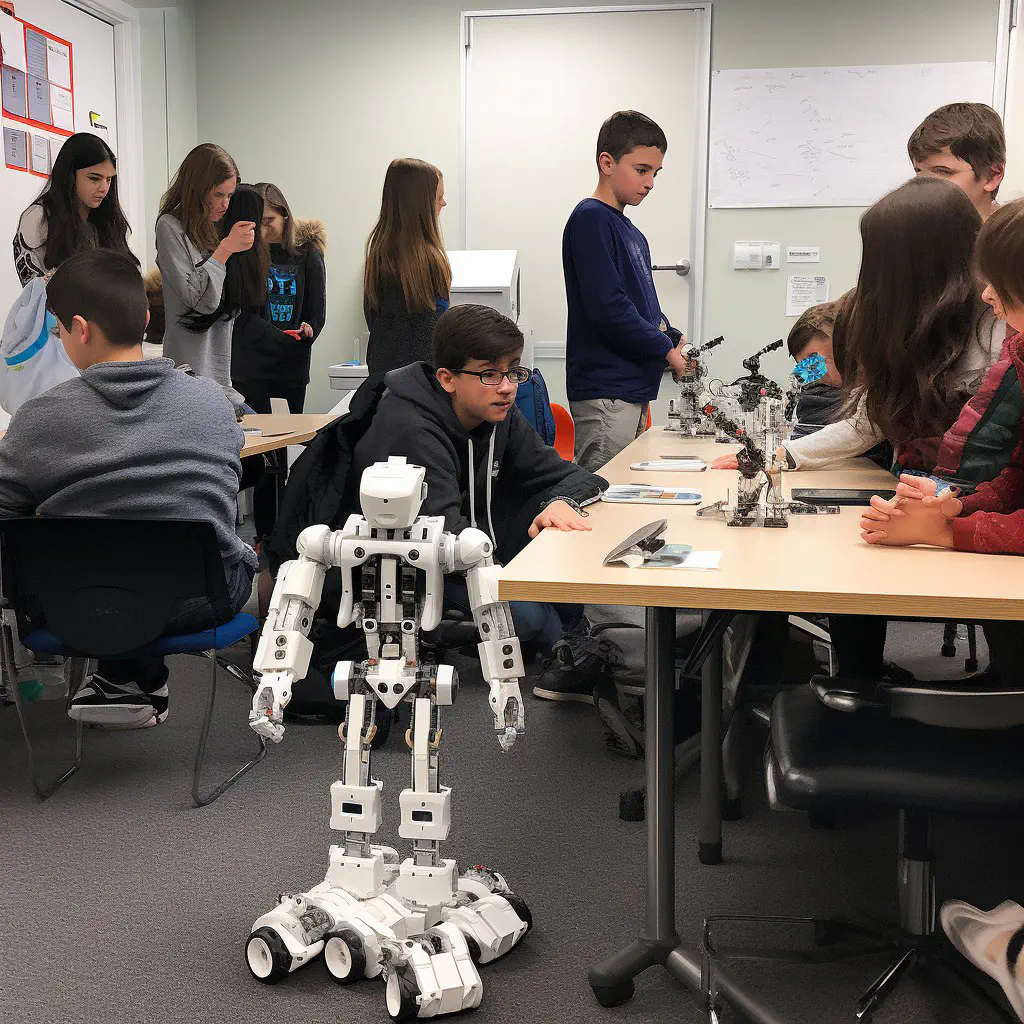
Introduction
Artificial Intelligence (AI) has taken over every aspect of our lives and transformed the way we do things. The education sector is no exception. AI is transforming the education sector at all levels, from preschool to higher education, and in every area, including teaching, learning, and administrative tasks. AI in education is bringing a new age of personalized learning, feedback, and engagement, allowing students to learn at their own speed, with improved learning outcomes.
The use of AI in education has revolutionized the education industry in ways that could not have been imagined just a few decades ago. AI algorithms are now being used to automate tedious administrative tasks such as grading, scheduling, and record-keeping, freeing educators to focus on teaching and learning. With its vast potential and the promise of endless possibility, it is important to explore the benefits that AI brings to education, as well as some of the ethical concerns that may be inherent in using this technology.
In this article, we aim to provide exclusive insights into how AI is transforming and enhancing the education sector. We will explore the advantages of AI in education, how it is changing the education landscape, and the ethical implications of using AI in education. We will also explore the future of AI in education and the prospects of AI-powered classrooms.
Advantages of AI in Education
The integration of AI in education has led to a wide range of advantages that have largely improved the education sector. Here are some of the key advantages of AI in education:
Improved Learning Outcomes
One of the main advantages of AI in education is improved learning outcomes. AI technology has the ability to identify the strengths and weaknesses of individual students, which can provide insights into how to tailor instruction for each student. This can lead to better academic performance, higher grades, and increased retention rates.
Personalized Learning
AI in education provides personalized learning opportunities for learners. It helps educators to recognize the learning needs of each student and tailor the teaching content, speed, and style of instruction accordingly. This personalized approach is especially useful for students with learning difficulties, gifted students, or those who are not challenged enough by traditional classroom teaching.
Enhanced Student Engagement
AI in education also helps enhance student engagement, adapting to individual learning styles, and catering to the needs of the student. According to a recent study conducted by Carnegie Learning, the use of AI-powered software led to a 16% increase in student engagement. AI technologies can create interactive and immersive learning experiences, such as gamification, simulations, and virtual reality, which increases participation and engagement.
Streamlined Administrative Tasks
Another key advantage of AI in education is the ability to streamline administrative tasks. AI-powered systems can automate tasks such as grading, attendance, and report generation, which can save significant time for educators. This allows them more time to focus on planning and delivering content that enhances the teaching and learning experience.
In conclusion, the incorporation of AI in education has many benefits, including improved learning outcomes, personalized learning, enhanced student engagement, and streamlined administrative tasks that can have a transformative effect on the education system.
AI and Curriculum Development
AI has the potential to transform how curriculums are developed in the education sector. The traditional method of curriculum development is a time-consuming process that requires manual effort. However, Artificial Intelligence can streamline this process, making it more efficient and effective.
Changing the Education Landscape
The integration of AI in curriculum development is changing the education landscape. AI technology can analyze data on student learning outcomes and tailor learning experiences to meet individual needs. This personalized approach can enhance student engagement and improve learning outcomes. AI can also help educators identify gaps in the curriculum and adjust the content to meet the needs of today’s learners.
Advantages of AI in Curriculum Development
One of the significant advantages of using AI in curriculum development is its ability to adapt and evolve. AI can analyze data on student performance and make changes to the curriculum in real-time. This flexibility enables educators to keep up with the needs of today’s learners and create a constantly evolving and adapting curriculum.
Another advantage of AI in curriculum development is its ability to remove bias. Human educators can unintentionally incorporate their biases and beliefs into the curriculum. However, AI algorithms use data-driven decisions that are unbiased and based on objective evidence.
The Impact on Teachers and Students
The integration of AI in curriculum development will impact both teachers and students. Educators will need to be trained in how to integrate technology into the curriculum effectively. This training will enable them to use AI tools and technology to enhance their teaching and improve learning outcomes.
Students will benefit from personalized learning experiences that are tailored to their individual needs. The AI-powered curriculum will provide learners with a learning experience that is tailored to their unique learning style, enabling them to learn at their own pace.
In conclusion, AI integration in Curriculum development is a game-changer that has the potential to transform how curriculums are developed and taught in the education sector. Its ability to adapt, remove bias and personalize learning experiences will ultimately enhance student engagement and improve learning outcomes.
AI-powered Classrooms
AI-powered classrooms are education spaces that leverage Artificial Intelligence to enhance learning outcomes, improve student engagement, and personalize learning. With AI-powered classrooms, students can enjoy a more personalized experience that is tailored to their unique learning needs and abilities. AI-powered classrooms leverage AI tools such as chatbots, virtual tutors, and digital assistants to deliver learning experiences that are tailored to the student’s specific needs, abilities, and interests.
Advantages of AI-powered Classrooms
The advantages of AI-powered classrooms include:
- Personalized Learning: AI-powered classrooms offer personalized learning experiences that are tailored to each student’s specific needs, interests, and abilities.
- Improved Learning Outcomes: AI-powered classrooms offer better learning outcomes as they leverage AI to deliver more engaging and comprehensive learning experiences.
- Real-Time Feedback: AI-powered classrooms offer real-time feedback that helps students monitor their progress and adjust their learning strategies.
- Streamlined Administrative Tasks: AI-powered classrooms automate administrative tasks such as grading, attendance tracking, and reporting, allowing teachers to focus on teaching.
AI-powered classrooms offer a wide range of possibilities that can revolutionize the way students learn and interact in the classroom. AI-powered classrooms can transform traditional one-size-fits-all instruction to an individualized learning experience that is customized for each student.
Potential of AI-powered Classrooms
The potential of AI-powered classrooms is substantial and can contribute significantly to the transformation of the traditional classroom model. AI-powered classrooms allow educators to provide personalized learning opportunities, which help students build their strengths and weaknesses. As AI gets more intelligent, it opens up the possibility of integrating voice-activated systems that can help with task completion, quizzes, and more. AI-powered classrooms can also help teachers to identify students’ learning difficulties more quickly and provide tailored interventions to improve their performance.
Examples
Several schools have implemented AI-powered classrooms and achieved notable results. One such example is the American Public University System (APUS), which incorporates AI tools in its online courses. APUS has introduced a Virtual Writing Center that uses AI to offer personalized writing feedback to students. Another example is the Georgia Tech Online Master of Science in Computer Science program, which uses AI-powered chatbots to address students’ concerns and offer real-time feedback.
AI-powered classrooms offer a lot of possibilities to teachers and students. AI-powered tools provide real-time feedback, personalization features, and proactive recommendations which can improve students’ performance.
Ethical Implications
As with any new technology, the use of Artificial Intelligence in education raises several ethical concerns. One major concern is the potential for AI to exacerbate existing inequalities in education. For example, if AI is used to personalize learning experiences for students, there is a risk that students from marginalized populations may not receive the same level of personalization as those from more privileged backgrounds.
Another ethical consideration is the issue of privacy and data security. Schools and educational institutions often gather vast amounts of information from students, including academic performance, personal information, and even biometric data. This information is highly sensitive, and the use of AI could potentially put it at risk.
In addition, the use of AI in education raises questions about the role of teachers. Some worry that AI-powered classrooms could eventually replace human teachers altogether, raising concerns about employment and job security.
Finally, there are ethical concerns around the use of AI in assessments. While AI offers the potential to evaluate student work quickly and accurately, there is a risk that it may not be able to account for things like creativity, originality, or critical thinking skills.
As AI continues to transform the education sector, it is important to carefully consider these ethical implications and develop guidelines and best practices to ensure that its use is ethical, responsible, and equitable.
Future of AI in Education
As technology progresses, so does the growth of Artificial Intelligence. The potential of AI in the education system is massive, and it is creating a revolution in the way we look at education.
Growth of AI in Education
The rapid growth of AI in education predicts a future where technology and personalized learning will merge. Educators will be able to provide an education tailored to the individual student’s needs and strengths. AI will automate administrative tasks, allowing teachers to focus on activities that require human interaction, such as mentoring and collaboration.
Possibilities of AI-Powered Classrooms
AI-powered classrooms hold immense possibilities. In the future, AI could be integrated into education systems in a way that is both efficient and practical. Teachers could receive AI-powered insights to make decisions about their classes, and students could use AI-enabled tools to learn better. AI-powered classrooms could eliminate the need for conventional grading systems, and the learning process could be optimized for each individual student.
Integration of STEM-oriented fields
There is immense scope for AI in STEM-oriented fields. AI can provide students with real-time feedback as they learn complex subjects, promoting a deeper understanding of the subject matter. It can also help students solve problems they might have otherwise been unable to solve. With the integration of STEM-oriented fields, students will be empowered to reach new heights in their academics, preparing them for future challenges.
Advancements in AI and the Education System
Advancements in AI technology will significantly impact the education sector. AI systems will become more advanced, capable of handling more complex tasks that are beyond the scope of human capabilities. AI will help both students and teachers achieve more, leading to a more efficient and rewarding education experience for everyone involved.
Conclusion
The future of AI in education is limitless. There is no doubt that AI technology will revolutionize the way education is delivered. AI-powered classrooms, personalized learning techniques, and the integration of STEM-oriented fields will empower both students and educators to achieve greater heights, preparing them for the challenges of the future. Investing in AI-powered tool and systems will be paramount to achieving the most optimal education experience for all.
Conclusion
In conclusion, we have seen how Artificial Intelligence is transforming the education sector by enhancing learning outcomes, providing personalized learning, enhancing student engagement, and streamlining administrative tasks. We have also seen how AI is changing the education landscape and the advantages of using it in curriculum development. AI-powered classrooms have been shown to have numerous benefits, such as enhancing learning outcomes and paving the way for more innovative and engaging learning experiences.
However, we must also be aware of the ethical implications of using AI in education, such as the impact on privacy and data security and the professional ethics of teachers and AI. Looking to the future, we can expect to see continued growth in the use of AI in education, with possibilities for even more advanced AI-powered classrooms and the integration of STEM-oriented fields. Ultimately, Artificial Intelligence has the potential to transform education into a more effective and engaging experience for students, opening up new possibilities and opportunities for learning.
References
-
Al-Fadhli, A. (2018). The impact of artificial intelligence on education. Journal of Information Technology Education: Research, 17, 235-261. https://doi.org/10.28945/4001
-
Cheon, J., Lee, S., Crooks, S. M., & Song, J. (2019). A review of research on technology-based interventions for reading skills of elementary students. Journal of Educational Technology & Society, 22(1), 74-85.
-
Koedinger, K. R., & Corbett, A. T. (2012). Educational big data. Educational researcher, 41(9), 16-25. https://doi.org/10.3102/0013189X12457710
-
Loviscach, J. (2020). Artificial intelligence in education: A critical review. Journal of Educational Technology & Society, 23(2), 1-10.
-
Luebeck, J., & Radke, S. (2019). Teachers’ perspectives on using artificial intelligence in education. Journal of Educational Technology & Society, 22(1), 86-97.
-
Martin, F., & Ertzberger, J. (2019). Here and now mobile learning: An experimental study on the use of mobile technology. Journal of Educational Technology & Society, 22(1), 68-73.
-
Pike, K., & Reuter, R. (2020). The challenges of using artificial intelligence in education. Journal of Educational Technology & Society, 23(3), 36-42.
-
Reddy, M., & Yen, C. J. (2020). A review of artificial intelligence and augmented reality in education: Looking toward the future. Journal of Educational Technology & Society, 23(1), 1-8.
-
Slotta, J. D., Wenger, E., & Fournier-Viger, P. (2019). Enhancing teacher-learner relationships with artificial intelligence. Journal of Educational Technology & Society, 22(1), 98-108.
-
Wang, D., Peng, W., & Nisbet, D. (2017). Expanding the educational uses and applications of video games. In Oxford research encyclopedia of education (pp. 1-18). Oxford University Press. https://doi.org/10.1093/acrefore/9780190264093.013.104
-
Wang, T., & Meinel, C. (2020). Deep learning in education: A review. Journal of Educational Technology & Society, 23(2), 1-18.

